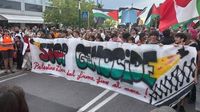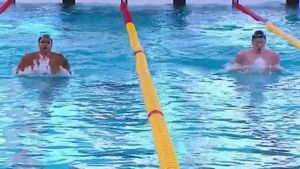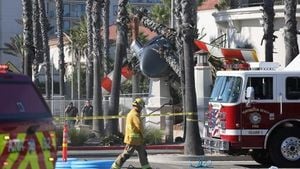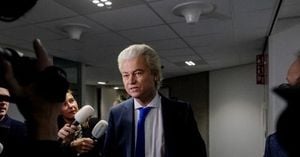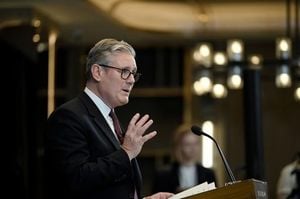The Venice Film Festival, one of the world’s most celebrated cinematic gatherings, found itself at the epicenter of global political discourse on August 30, 2025, as thousands gathered on the Lido to protest Israel’s ongoing military campaign in Gaza. What is typically a star-studded event, drawing celebrities like Julia Roberts, George Clooney, and Emma Stone, was transformed—at least for a day—into a stage for urgent calls to address the humanitarian crisis unfolding in the Gaza Strip.
According to Deadline, hundreds of protestors, including local political and grassroots organizations as well as some accredited festival guests, assembled on the main Santa Maria Elisabetta avenue, just a mile from the festival’s central hub. The demonstration, which was peaceful and included families and people of all ages, aimed to draw the world’s attention to what organizers described as an Israeli "genocide" in Gaza. Their intention was clear: “At a time when the eyes of the world will be on Venice and the Film Festival, we have a duty to make the voices of all those who are outraged and rebelling heard: let us therefore turn the spotlight of the Festival on Palestine,” the organizers explained in a statement earlier in the week.
But the protest was far more than a local affair. As Variety reported, thousands joined in—festival guests and members of the public alike—creating what may be the largest protest ever seen at a major film event over the Gaza conflict. The march, supported by a coalition of groups and associations, was vibrant despite its serious message. Palestinian flags waved above the crowd, chants of “Free Free Palestine” echoed through the air, and some protestors even took to stilts, hoisting banners for peace. Music, flares, and foghorns contributed to an almost carnival-like atmosphere, though the gravity of the protest’s purpose was never in doubt.
The demonstrators’ path toward the festival center was blocked by a heavy police presence, and main roads on the Lido were closed as the march progressed. Protestors were ultimately prevented from entering the festival grounds for safety reasons, but their voices—and the sound of helicopters overhead—remained audible from a distance, even as the world premiere of Guillermo Del Toro’s Frankenstein prepared to commence.
Protest organizers were unequivocal in their condemnation of Israel’s actions in Gaza and the West Bank. In a statement cited by Variety, they said: “In Gaza, hospitals, schools and refugee camps are being bombed; civilians are being deprived of food and water; journalists and doctors are being killed; humanitarian ships such as the Freedom Flotilla are being seized. At the same time, in the West Bank, apartheid and settler violence continue unabated. The permanent occupation of Gaza by the Israeli government marks an escalation that has gone beyond every limit of humanity and international law.” The statement went further, accusing Italy and Europe of complicity through arms supplies, economic agreements, and diplomatic cover, and demanding: “It is time to stop the massacre: stop the genocide, stop arms sales, stop Western complicity.”
The protest gained significant momentum after Venice4Palestine (V4P), a coalition of Italian and international film professionals, issued an open letter the previous weekend. As reported by The New York Times, the letter demanded that the festival and its parent body, the Venice Biennale, take a clear and unambiguous stand in condemning the destruction and suffering caused by Israel’s military campaign in Gaza. “We—activists and workers in the film, media and news fields—believe that for once, the show must stop: We must interrupt the flow of indifference and open a path to awareness,” the letter read. Hundreds of actors, directors, and producers, including Swann Arlaud, Charles Dance, and Gaza-born filmmakers Arab Nasser and Tarzan Nasser, added their names to the call for action.
Among the demonstrators were notable figures from the film industry. Italian actor Roberto Zibetti, who attended the festival as a cast member in three films, spoke passionately about the symbolic power of creativity in times of conflict. “It’s symbolically interesting to say that creativity can be an arsenal of peace,” Zibetti said. “I’m happy to make louder the simple sentence of ‘Stop killing.’” Venice student Emilia d’Agnano, holding a banner at the front of the march, remarked, “Today in the Lido di Venezia, there is one of the most important global events in cinema, where the richest people in the world are here to distract the masses from something we think is really much more important.”
The festival itself, usually known for its focus on art rather than politics, found itself under increasing pressure to respond. Protestors had earlier waved Palestinian flags and unfurled a banner reading “Free Palestine. Stop the Genocide” in front of the festival’s headquarters, Palazzo del Cinema. As international condemnation of Israel’s war on Gaza grew, the Venice Film Festival became, in the words of Variety, “one of the noisiest” platforms for the debate.
In addition to calls for condemnation, Venice4Palestine and other activists urged the festival to withdraw invitations to celebrities perceived as supportive of Israel, such as Gal Gadot and Gerard Butler, stars of Julian Schnabel’s film In the Hand of Dante. Gadot, an Israeli native who served in her country’s military, and Butler, who attended a 2018 gala in support of the Israeli army, were both named in letters from protest organizers. Festival artistic director Alberto Barbera confirmed that Gadot would not attend, but he stood firm on the festival’s policy of not rescinding invitations based on political views. “If they want to be at the festival, they will be here,” Barbera stated at a press conference. He also expressed the festival’s sorrow over the situation: “We have never hesitated to clearly declare our huge sadness vis-à-vis what is happening in Gaza, in Palestine, the death of civilians and especially of children who are victims.”
The Venice Biennale, which oversees the festival, reiterated its commitment to open discussion and highlighted that films addressing the Gaza war were included in this year’s program. “The Venice Film Festival has always been, throughout their history, places of open discussion and sensitivity to all the most pressing issues facing society and the world,” the Biennale said in a statement.
Jury president Alexander Payne, for his part, chose to keep the focus on cinema, stating, “I’m here to judge and talk about cinema. My political views, I’m sure, are in agreement with many of yours.”
The war in Gaza, now approaching its second anniversary, has had a devastating impact on the enclave’s civilian population. According to Gaza’s Health Ministry, over 39,000 people had been killed as of July 2025, a figure that does not distinguish between civilians and combatants. In August, global experts declared Gaza City and neighboring areas officially suffering from famine, adding urgency to the demands for international action voiced at the Venice protest.
As the festival’s red carpet was rolled out for cinematic premieres, the sounds of protest and calls for justice served as a stark reminder that, even in the world of art and glamour, the realities of war and human suffering can—and perhaps must—take center stage.
